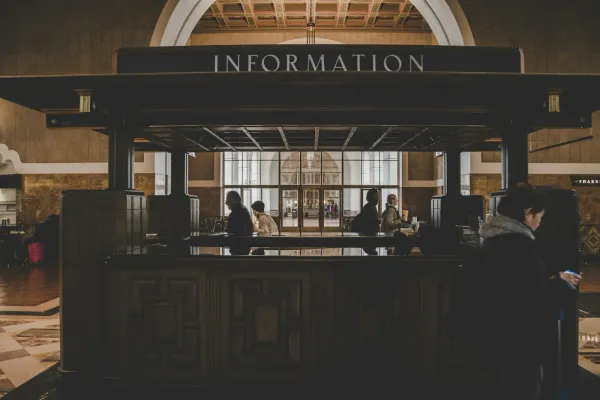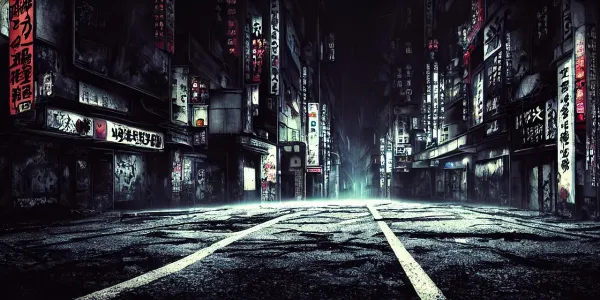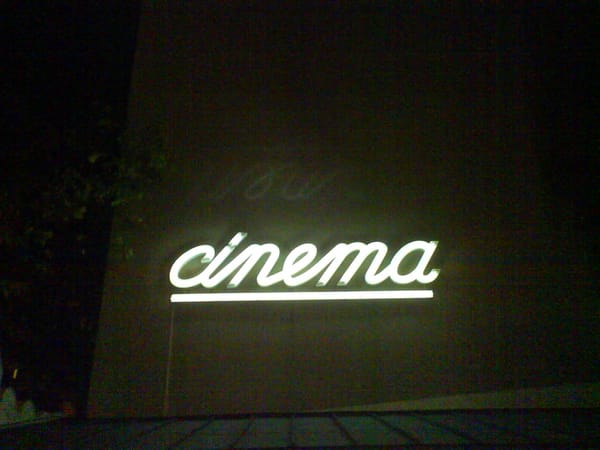Anon - Privacy and Freewill
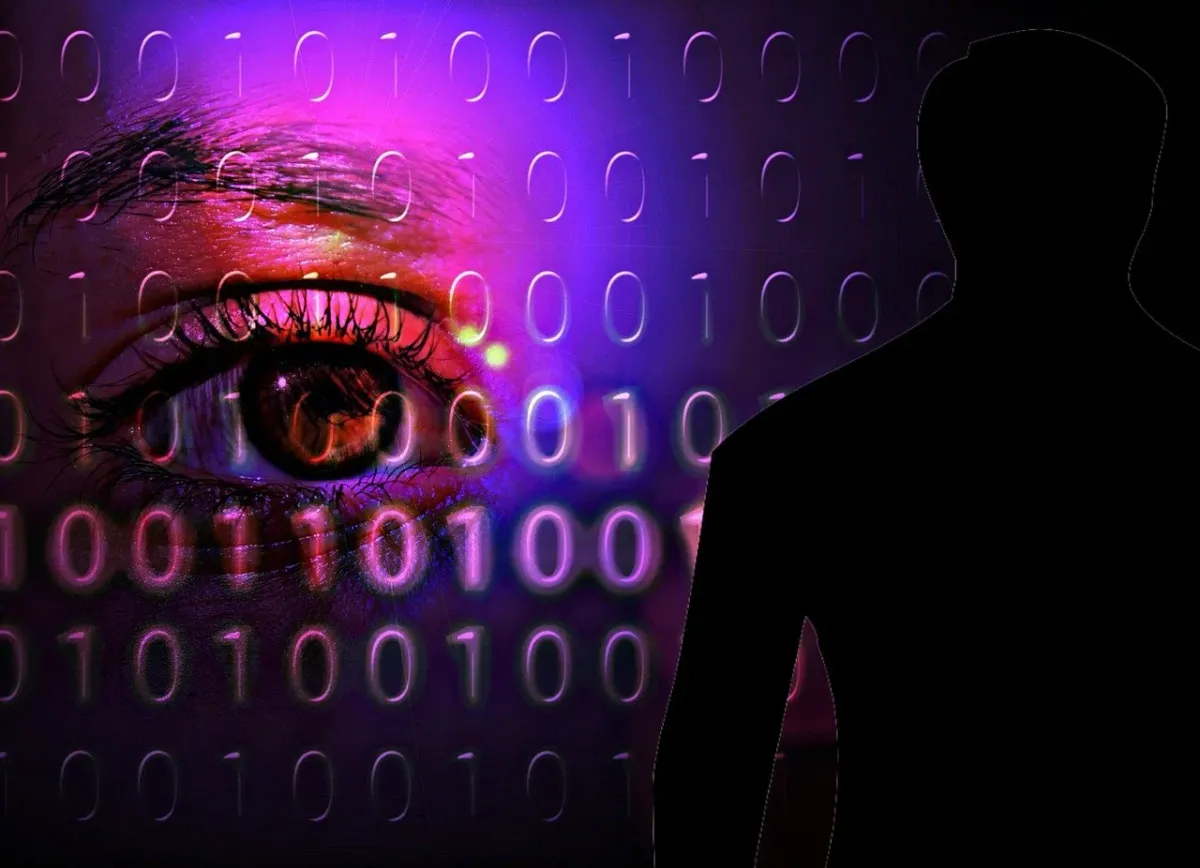
Welcome back to Celluloid Circuits, where we explore the intersections of technology and its portrayal in film. In our first post, we kicked things off with the film Johnny Mnemonic, a cyberpunk classic that tackled themes of information overload, the digital age and humanity. If you missed it, be sure to go back to my previous post and check it out! Today, we’re diving into Andrew Niccol’s 2018 sci-fi thriller, Anon. This film takes us into a world where privacy has been entirely given up in the name of safety, and it raises questions about the trade-offs between surveillance and personal freedom. Which we are currently wresting with so lets….get off grid.
Synopsis
Anon is set in a dystopian future where advanced technology "The Minds Eye" and the "The Ether" allows for constant surveillance of everyone’s lives. People's memories are recorded and stored in a system called "The Ether," which law enforcement can access at will to solve crimes. Even being able to actively see through someone else's eyes literally. Privacy is essentially non-existent, as even minor interactions and mundane moments are cataloged and available for scrutiny. This ever-present surveillance not only eliminates the ability to keep secrets but also reshapes societal norms, pushing people into a life of conformity. People live under constant pressure to conform, knowing that every action is being observed and recorded. It raises the question of whether true individuality can survive in a world where all our actions and behaviors are watched and analyzed.
As the commissioner points out "Anonymity is a crime", this goes back to the age-old bias that if someone is hiding, they must be hiding the truth or for hiding due to some nefarious reason. Just like the idea that if someone pleads the 5th, they are seen as guilty. During jury selection lawyers will ask potential jurors if there client does not testify or plead the fifth, would we assume their client guilty. Again because it is a known bias.
I feel that amada seyfrieds charactor sums up this really easy with line in the film, which is obviously used to get audiences thinking. " Its not that I have anything to hide, there is nothing I want you to see"

The story follows Sal Frieland, played by Clive Owen, a detective in this hyper-surveilled dystopian society. Whose Son passed away in a tragic accident and Sal is still trying to cope ala Tom Cruise Minority report style. Speaking of which this film shares some similar themes. With differing technology…Future post maybe . Anyway Sal is investigating a string of murders where the killer appears to have hacked The Ether, disguising their presence by hijacking the victims Mind eye a term used in film and so the killer is not seen by victim, which also leads to panic in the victim as shown in the film, as they wrestle to understand what it is they are seeing. But more importantly the killer is also able to delete or mask their meta data enabling them not to be seen in the Meta data of the captured record. rendering them invisible. The investigation leads Sal to "The Girl," played by Amanda Seyfried, a mysterious figure who operates outside the system. She specializes in removing records of minor crimes that people do not want others to see, leaving no proof of these infractions.
Time for a little crunch
What is Meta Data, this has nothing to do with Facebook, but we will get there in a bit. The simplest definition I can give is that meta data is data about data. Make sense ok let move. Just kidding think things like file size, author, data created, modified, location data etc. These are all examples of meta data. Now that we have our feet wet let’s dive into some of the interesting bits from the film:
The first and this is more of an aesthetic viewpoint, is everything is so brutal. The buildings are all square, the film has a grey look to it. All clothing is devoid of color. Even the Augmented reality overlays are black tech overlays. Even the advertisements which are normally full of color and simple black outlines. Showing how this technology pressed all aspects of society into a very bleak conformity. The Aether looks more like a wireframe model of an application. Almost as if the design was to remove all clout and clutter.
The 2 pieces of tech that the film revolves around are essentially Augmented Reality (the minds eye) and a very distributed Cloud storage (The Ether). Lets start with the very sophisticated and very integrated minds eye.
In the film we learn that the Minds eye is what records everything into the Ether. However this is not a simple storage device. The Minds eye technology seems like a cell phone as we see people going about their daily lives using it as they would a cell phone. They can use it to pay as we see when one of the detectives pays for his hotdog with-it. People use it to call one another, send messages, browse what appear to be message boards, check stock prices, etc. This seamless integration of augmented reality into daily life feels less futuristic and really is more of an evolution of where we are now in our ever connected society.
I want to go through a few of those features and see how they are presented in the film, but I want to start with how the film opens up. We see Sal's point of view and see that the Minds eye has built in Augmented reality overlays as if it was virtual reality tech we would not see the meat space behind the overlay. These overlays, show advertisements, recognition software or recog as its mentioned in the film. This software analyzes everything from cars on the streets to peoples identifying information name, occupation, etc. I assume because Sal is a police officer he has access to this level of information and that not everyone can see all that info about another individual. Unless maybe they choose to share it. Again this is all speculation
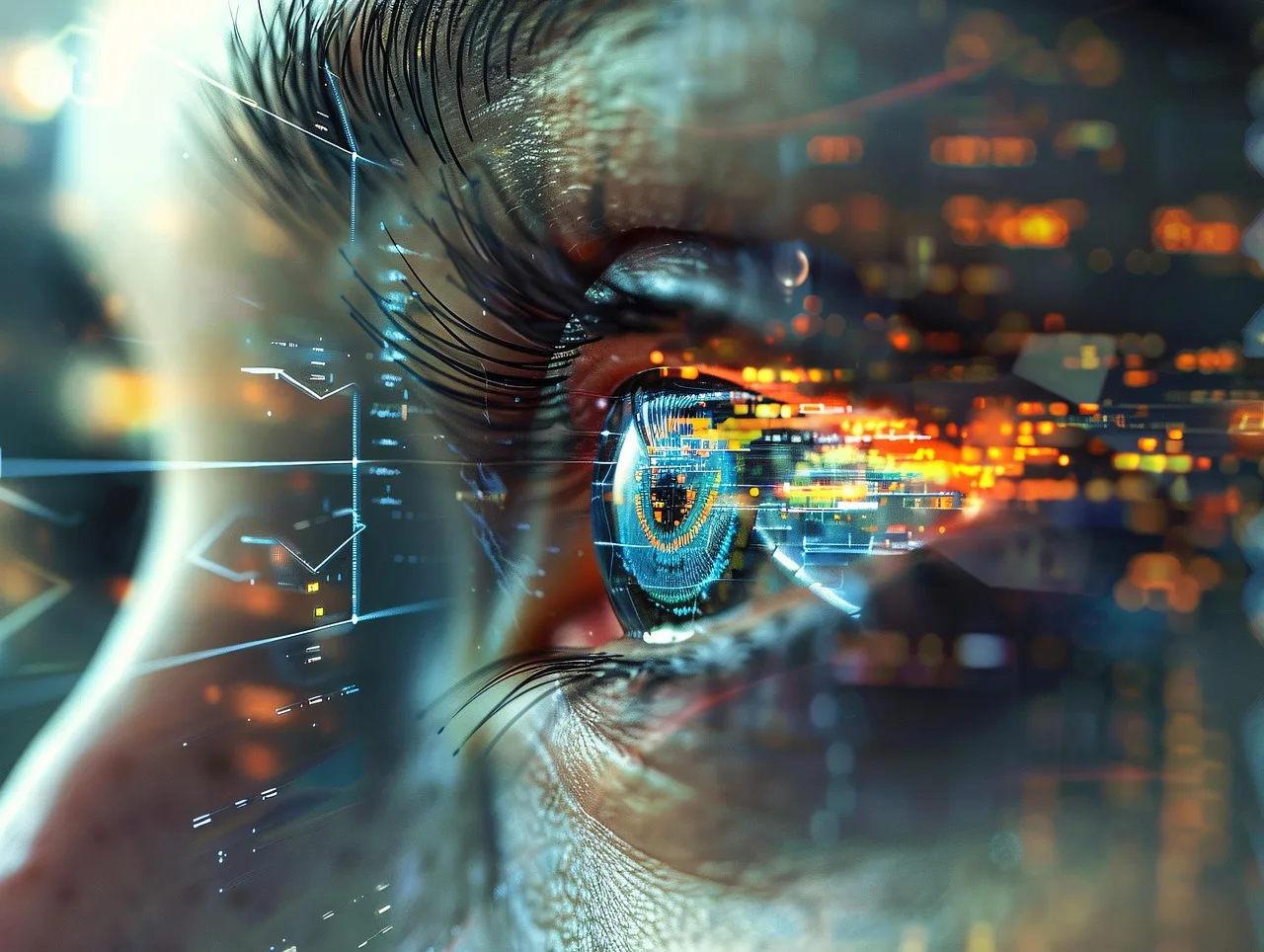
This minds eye is seemingly embedded into peoples everyday lives. So much so that advertisements can only be seen when viewed through the minds eye. If turned off then the advertisements go away and none can be seen in the real world in their place. An as we know companies are all about the bottom line they would not invest so heavy in this area of adverts if the returns were not worth it. This technology is implanted very early on in life at birth, or maybe even implanted or bioengineered in the womb. This is my best guess as the film does not really go into this. Why I think this though is because of one scene they bring up the POV of a baby to see another angle of a shooting. The infant is fairly young so, it is safe to assume that they are born with it or implanted very young. This gives us a further look into other features of the minds eye. While we see the infants POV we also hear a lullaby playing in the background and if you look in the bottom corner there is a representation of a tape playing that song. And based on the footage that you can hear the audio, the device must interface with the audio area of the brain to stimulate it to hear that specific piece of music. There are multiple instances of this, audio being heard from either a memory, advertisements and even when the kid is playing a video game using his minds eye the gunshot is only heard on the users end. Makes for a quiet and eerily silent world.
One question the baby scene brings up is the security concept of Authentication and Authorization. Basically who are you and what do you have access to either based on your account or role. I am assuming that this infant would not be able to control their own minds eye. So that begs the question are the parents able to control it, which I believe as who else would turn on the music for the infant. This goes deeper as what other privileges access do parents have over their children's minds eye. It looks that as adults one needs to ask permission to share memories or "files" for simplicity. But parents may have authority due to thier role as care giver. Do parent have to sign waivers when there students go to school and then teacher have this access, who knows this is all best guess. I cannot imagine what that would do to the psyche of the child knowing that they are in a constant state of surveillance.
We know that as police officers, the detectives can retrieve recorded events from the Aether. From an IT perspective someone has to go into some account management system and add Sal's unique ID into the police officer role, which would already be configured to give SAL the proper authority or Authorization to view these "files."
This also leads to the key flaw that is exposed in the film. A hacker breaks into the system, gives him self not only privileged read access but write and edit access as well. This allows him to implant himself into the investigation for the mysterious girl. He uses this access to plant information that the police commissioner has worked with him before and to recommend him to work on this case. But again if all the information is stored in this central location with limited safeguards this is a single point of failure for the whole system. There is also the issue with data backups, when Sal's memories of his son are erased how come there was no air gapped backup. Unless of course this hacker had complete admin access which is bad security design. Also how to be deterime the integrity of the data. Data integrity is a cornor stone or 1 of the tenents in cybersecurity. The other two are Confidentiality and Availability.
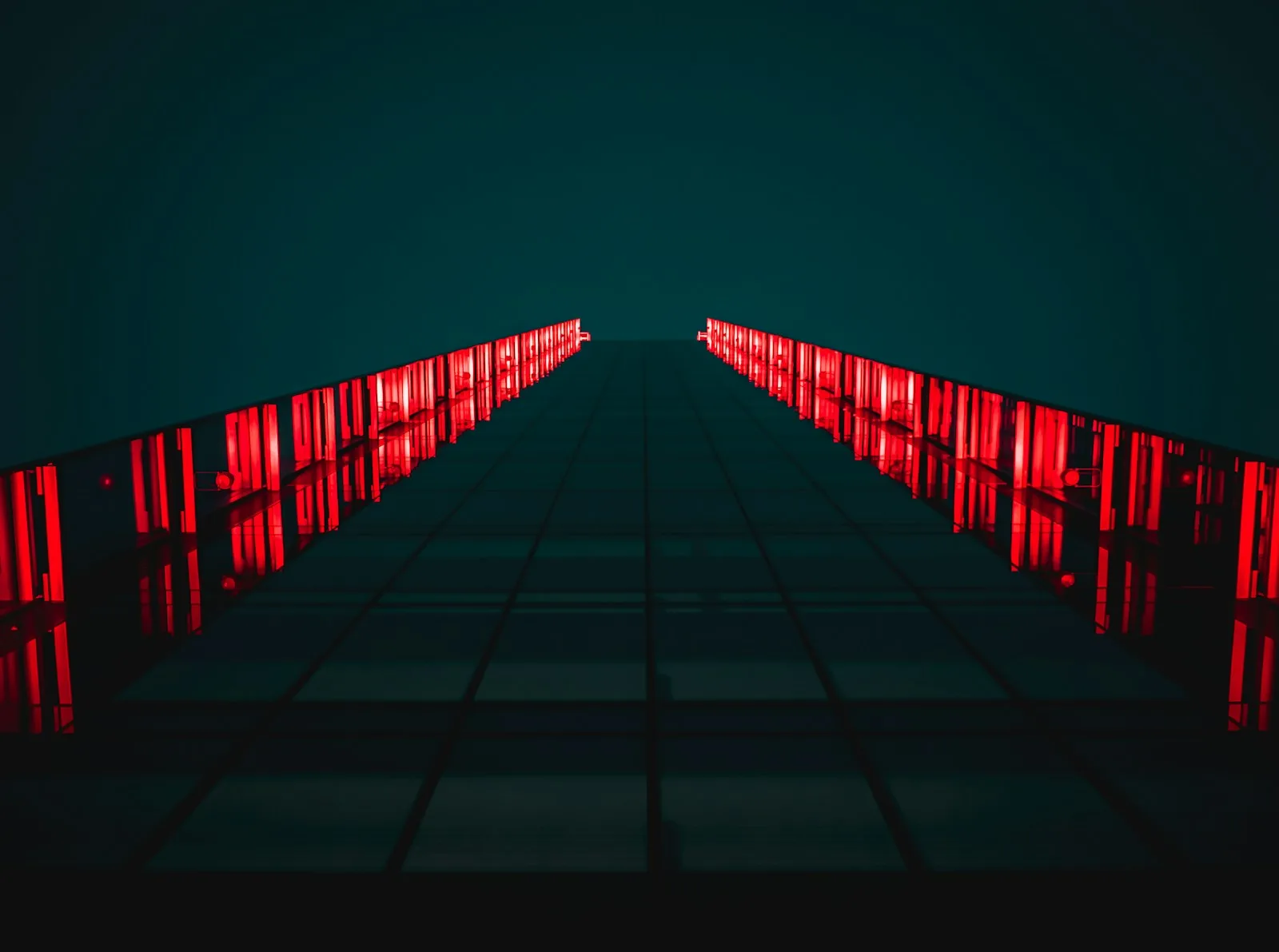
Anon is visual proof of the dangers of trading personal freedom for security and transparency. The idea is that if your are always being watched than you or others will be less likely to commit a crime. Really this system is only a deterrent as there are not protections in place to stop the user from performing a specefic action. Evident in the scene where the gun nut who was drinking and browsing 2nd amendmant forums, shots an unarmed man. The system never stopped him, it did after the fact tell him that a crime had been commited and to turn himself in. This is also seen in the film when the son commits suicide his minds eye warns him to step back but does not stop him. I am relieved though because even though we know the Minds eye is interfaced with the brain. It cannot assume control. In Cybersecurity terms this system is a deterent and not a proventative and it does not stop the crime.
Anon's mind eye is the perfect surveillance technology, allowing law enforcement to view everything you see and do with what appears to be without a warrant and only talks of access. Who is to say that this cant be or already has not been taken advantage of by some bad actors as seen in the film with the main antagonist to just view all this information. This makes me think of the Altered Carbon tv show and books. There is a class of tech criminal in the series called a dipper where they access peoples memories as they are being backed up, dip in pull out some information and sell it as an exclusive look into this persons life, obviously this is done with public figures and such. Who is to say this is not some type of crime here, I am sure people want to see the most darkest secrets about public figures. Again this is all about giving up the right to decide what you share, because its all shared.
Even Amanda seyfrieds character seems to have more values than the police and states I will only look at what you want me to. Where as the police seem to have carte blanche in what they can see. I am sure there may have been talks of accountability when implementing this technology but yeah we know how the police run.
How does the absence of privacy affect our relationships. Sal’s interactions feel sterile and transactional. In the scene with SAL having intercourse with another women, it seems very route and lacks passion. There is this idea about privacy vs secrecy. Privacy is having your own thoughts feelings and actions. Its the ability or really right to be alone when needed and choose what, when and who you share these ideas with. Secrecy I feel like it what the technology was trying to address, you can not lie as you will be caught, but for this the society has given up thier right of privacy and in esccense individuality
The second critical piece of tech for this society is the Aether, a distributes storage, content delivery and even internet style network that houses all these individuals recorded daily life and meta data. This storage network must be complex and have very accurately defined meta data to locate these individuals files. As it does not take long to retrieve this files, and I call them such not only for simplicity but also because in the film, when some one dies it literally says end of file. In the film the users are able to interact with the Aether to browse discussion forums, play videogames, make phone calls. Though we do not get to sped that much time in it. It is implied that there is more there to explore as Anon herself says she prefers it to the meat space of the real world. Imagine if you could pull up the internet in your head and look something up. Pay a friend by simply being nearby.
On the hardware side of things this storage network must be robust and distrubuted and replicated so that we can achieve the read speeds that seem to appear in the film. Not to mention what ever type of technology is being used to transmit data to and from the Aether.
Let do some speculation. We see that people lives are recorded until the moment they die. There must be receiving nodes from the Aether everywhere or a strong enough transciver in the humas body to facilitate this data transfer as we do not see lags or waiting periods. And since we do not see people trailing wires attached to themselves we have to assume this is all done with some form of wireless technology.
Anon is not afraid to tackle the real-world debates about data breaches, government overreach, and the ethics of mass surveillance. It poses the question: does perfect safety make us safer, or does it simply make us more susceptible to exploitation?
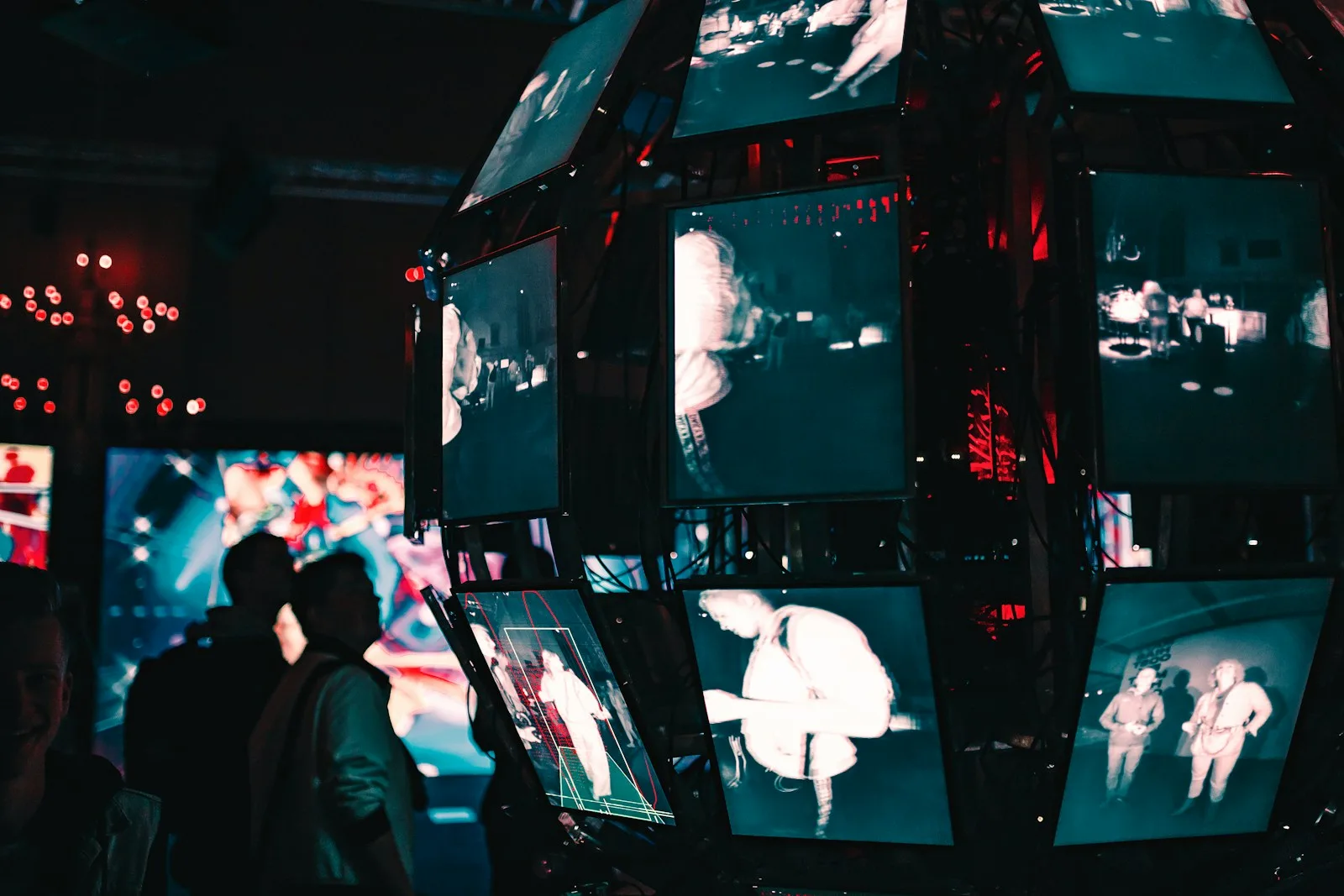
The film critiques the assumption that transparency automatically equals morality. Challenging the idea that making all information visible leads to a fairer or more ethical society, however the film points out how transparency can often serve as a tool for control rather than accountability. As the commissioner is trying to get the girl as it hinders there expansion into smaller minor crimes. The ability to assert more control over the information they are privy to. By depicting a system where those in power have unrestricted access to private lives, the film mirrors concerns about how governments and corporations use data to influence behavior, enforce conformity, and suppress dissent. Think about how much of our lives, is already cataloged online—our photos, our conversations, even our locations. Have an iPhone google the significant location feature. Social media platforms routinely harvest personal data, creating detailed profiles of users that are sold to advertisers. The cost of doing business, remember if your are not paying for something you are the product. For example, the Cambridge Analytica scandal exposed how data collected from Facebook users was exploited to influence political campaigns. Similarly, the increasing use of geo-location tracking in apps has raised concerns about how this information could be used beyond convenience, such as for targeted surveillance or manipulative marketing.
The Girl, who exists outside of the system, is seen as a threat—but her role raises ethical questions. Is she a criminal for protecting privacy, or is she a rebel against an oppressive system? Her anonymity gives her agency in a world that denies it to everyone else, allowing her true freedom and individuality.
Another fascinating aspect of Anon is how it visualizes technology. The seamless integration of augmented reality into daily life feels less like a futuristic leap and more like an evolution of where we are now. Even if the AR looks simple it is complex in nature and regardless of its minimalist appearance.
Ultimately, Anon doesn’t provide answers, and that’s what makes it such an intriguing film. It forces us to confront uncomfortable truths about our relationship with technology. How do we balance the need for security with the right to privacy? Is the cost of safety worth the erosion of freedom? These are questions we’re grappling with in our own world, making Anon not just a piece of speculative fiction, but a good look into our potential future if we don't stop to analyze the choices we are making today, in regards to privacy and our personal freedoms and security.
Thank you for following along on Celluloid Circuits. Next time, we'll be continuing our conversation about data privacy and technology with the film the Circle. You won’t want to miss it! Until next time, stay curious. An remember the future is only a reel away.
